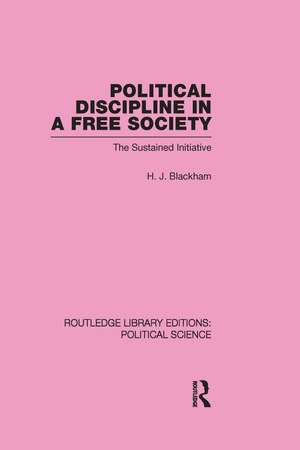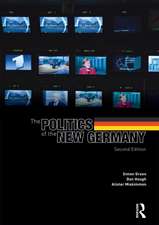Political Discipline in a Free Society (Routledge Library Editions: Political Science Volume 40): Routledge Library Editions: Political Science
Autor H. J. Blackhamen Limba Engleză Hardback – 6 oct 2009
| Toate formatele și edițiile | Preț | Express |
|---|---|---|
| Paperback (1) | 70.99 lei 6-8 săpt. | |
| Taylor & Francis – 13 iul 2012 | 70.99 lei 6-8 săpt. | |
| Hardback (1) | 824.17 lei 6-8 săpt. | |
| Taylor & Francis – 6 oct 2009 | 824.17 lei 6-8 săpt. |
Din seria Routledge Library Editions: Political Science
-
 Preț: 340.80 lei
Preț: 340.80 lei - 36%
 Preț: 992.79 lei
Preț: 992.79 lei - 36%
 Preț: 823.08 lei
Preț: 823.08 lei - 27%
 Preț: 242.91 lei
Preț: 242.91 lei - 37%
 Preț: 1023.84 lei
Preț: 1023.84 lei - 38%
 Preț: 763.26 lei
Preț: 763.26 lei - 54%
 Preț: 514.28 lei
Preț: 514.28 lei - 38%
 Preț: 765.77 lei
Preț: 765.77 lei - 36%
 Preț: 992.79 lei
Preț: 992.79 lei - 35%
 Preț: 1054.91 lei
Preț: 1054.91 lei - 36%
 Preț: 824.70 lei
Preț: 824.70 lei - 35%
 Preț: 1053.83 lei
Preț: 1053.83 lei - 24%
 Preț: 344.55 lei
Preț: 344.55 lei - 38%
 Preț: 765.40 lei
Preț: 765.40 lei - 38%
 Preț: 765.40 lei
Preț: 765.40 lei - 26%
 Preț: 221.84 lei
Preț: 221.84 lei - 36%
 Preț: 823.26 lei
Preț: 823.26 lei - 38%
 Preț: 764.87 lei
Preț: 764.87 lei - 38%
 Preț: 763.78 lei
Preț: 763.78 lei - 36%
 Preț: 823.63 lei
Preț: 823.63 lei - 36%
 Preț: 824.17 lei
Preț: 824.17 lei - 38%
 Preț: 764.34 lei
Preț: 764.34 lei - 35%
 Preț: 1056.00 lei
Preț: 1056.00 lei - 35%
 Preț: 993.87 lei
Preț: 993.87 lei - 36%
 Preț: 992.25 lei
Preț: 992.25 lei - 36%
 Preț: 822.01 lei
Preț: 822.01 lei - 36%
 Preț: 821.46 lei
Preț: 821.46 lei - 38%
 Preț: 765.40 lei
Preț: 765.40 lei - 36%
 Preț: 825.78 lei
Preț: 825.78 lei - 54%
 Preț: 513.20 lei
Preț: 513.20 lei - 36%
 Preț: 822.01 lei
Preț: 822.01 lei - 18%
 Preț: 1347.78 lei
Preț: 1347.78 lei - 35%
 Preț: 1048.08 lei
Preț: 1048.08 lei - 39%
 Preț: 682.29 lei
Preț: 682.29 lei - 36%
 Preț: 823.63 lei
Preț: 823.63 lei - 36%
 Preț: 823.63 lei
Preț: 823.63 lei - 37%
 Preț: 486.98 lei
Preț: 486.98 lei - 35%
 Preț: 993.32 lei
Preț: 993.32 lei - 32%
 Preț: 339.35 lei
Preț: 339.35 lei - 38%
 Preț: 763.26 lei
Preț: 763.26 lei - 35%
 Preț: 527.96 lei
Preț: 527.96 lei - 36%
 Preț: 822.18 lei
Preț: 822.18 lei - 36%
 Preț: 823.63 lei
Preț: 823.63 lei - 36%
 Preț: 820.40 lei
Preț: 820.40 lei - 27%
 Preț: 240.68 lei
Preț: 240.68 lei - 38%
 Preț: 765.40 lei
Preț: 765.40 lei - 38%
 Preț: 763.26 lei
Preț: 763.26 lei - 18%
 Preț: 1062.98 lei
Preț: 1062.98 lei - 18%
 Preț: 1279.05 lei
Preț: 1279.05 lei
Preț: 824.17 lei
Preț vechi: 1284.28 lei
-36% Nou
Puncte Express: 1236
Preț estimativ în valută:
157.72€ • 171.26$ • 132.49£
157.72€ • 171.26$ • 132.49£
Carte tipărită la comandă
Livrare economică 22 aprilie-06 mai
Preluare comenzi: 021 569.72.76
Specificații
ISBN-13: 9780415555814
ISBN-10: 0415555817
Pagini: 284
Dimensiuni: 156 x 234 mm
Greutate: 0.69 kg
Ediția:1
Editura: Taylor & Francis
Colecția Routledge
Seria Routledge Library Editions: Political Science
Locul publicării:Oxford, United Kingdom
ISBN-10: 0415555817
Pagini: 284
Dimensiuni: 156 x 234 mm
Greutate: 0.69 kg
Ediția:1
Editura: Taylor & Francis
Colecția Routledge
Seria Routledge Library Editions: Political Science
Locul publicării:Oxford, United Kingdom
Cuprins
1. Liberty, Equality, Fraternity 2. The Sovereignty of the People 3. The Perfectibility of the Species 4. The Pursuit of Rational Ends by Rational Means 5. Perpetual Peace 6. Order and Progress
Descriere
This book traces the rise and fall of political philosophies since the 17th century. The main argument is that social control is at its best a deliberate joint creation of and learning from social experience; and in this sense political discipline although not the same as logical or scientific discipline is like them a submission to form, not force. The book gives a definite meaning to the idea of human progress and finds reason for a restoration of political hope and faith.





















